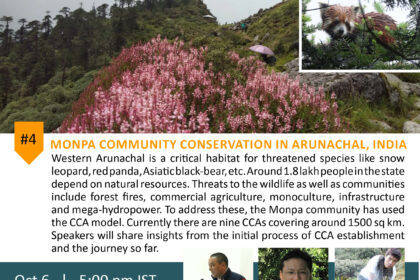Webinar: Community Conserved Areas in South Asia #4: Monpa Community Conservation in Arunachal Pradesh, India

Dear All,
As part of the webinar series on Community Conserved Areas organised by the ICCA South Asia Regional Coordination Committee, the next webinar will be on the Monpa communities in Arunachal Pradesh, India on 6th October at 5pm.
To register: https://zoom.us/webinar/register/WN_Kt65RLgzQkWPXd4iTDxPdA
To view on Youtube live: https://www.youtube.com/c/iccaconsortium/live
About the CCA
The Indian state of Arunachal Pradesh is located within the Himalayas Biodiversity Hotspot. Large parts of the state’s forested area (>60% accounting 3.1 million ha) are under traditional ownership of tribal communities. These forests are managed by clans, traditional village institutions and individuals. Within the West Kameng and Tawang districts of Arunachal Pradesh, the area under community custodianship is even higher. In these two districts, more than 80% of forests are de-facto under the jurisdiction of the local communities and administered by their customary laws.
The biological richness of the forests of Arunachal Pradesh are amongst the highest in the Himalayan region. The Western Arunachal Landscape, is endowed with luxuriant forests and a great diversity of plant and animal species, many of which are endemic to the Eastern Himalayas. The region is also a critical habitat for several species on the IUCN Red List such as the snow leopard, red panda, Asiatic black-bear, clouded leopard, golden cat, serow, and black-necked crane. Most of these threatened species are facing threats from habitat degradation and fragmentation, emerging developmental projects, hunting and other anthropogenic pressures.
Approximately 0.18 million people (with ~80% rural population) depend on natural resources in Arunachal Pradesh. Mostly, a traditional agro-pastoral system is followed using available natural resources. The community manages oak (Quercusgriffithii) forests around their farmland to collect fallen leaves for the purpose of mulching, and also practice mixed cropping with a combination of legumes that helps maintain soil fertility. However, the traditional dependency and relationship between the local communities and natural resources is eroding; threatened by an increase in commercial demand and a breakdown of traditional institutional mechanisms. The forests of Arunachal Pradesh face several other threats i.e. forest fires, clearing of forests for commercial agriculture, monoculture plantations, linear infrastructure and mega-hydropower development.
To address some of these challenges, the local Monpa communities of the region have mobilized themselves around the Community Conserved Area (CCA) model. The work to establish CCA in the forest areas under their jurisdiction was initiated nearly a decade and half ago and currently there are nine CCAs covering around 1500 sq. km of forest. It all began in Thembang village in West Kameng district when the local community setting up the Thembang Bapu CCA on 30 km2 of forests under their custodianship. Later, this was expanded to cover 635 km2 encompassing dense forests with snow-capped mountains and high-altitude lakes that provide a secure habitat for threatened species including the red panda and snow leopard. In order to complement and strengthen the forest conservation initiative, community-based tourism (CBT) was introduced in 2009. The CCA Management Committee in Thembang has greatly matured and operates independently. The Community Based Organization was also with a little support from WWF India able to manage and implement a project from the Department of Science and Technology, Government of India on marketing their crop produce. Community leaders and local team members from WWF-India will share insights and learning from the initial processes of CCA establishment and the journey so far.
Speakers:
Jam Tsering, Zilla Parishad Member & Secretary, Thembang Bapu Community Conserved Area.
Pema Wange Sr. Project Officer, WWF-India & Member, Thembang Bapu Community Conserved Area.
Lham Tsering Field Officer, WWF-India & Member, PangchenLakhar Community Conserved Area.
Kamal Medhi Landscape Coordinator, WAL, WWF-India.
Pijush K Dutta Lead, Community Engagement, WWF-India
To view the previous webinars:
1. Fishing Communities of Loktak Lake, Manipur by Salam Rajesh
2. Wetland Conservation in Vidharba, Maharashtra by Manish Rajankar(BNVSAM) and Shalu Kolhe
3. Van Panchayats in Uttarakhand by Malika Virdi, Rekha Rautela and Beena Nitwal
For any query or to sign up to the CCA South Asia elist, please write to [email protected]
Regards
ICCA South Regional Coordination Committee
